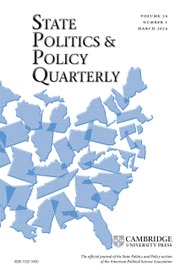Article contents
Wallet-Based Redistricting: Evidence for the Concentration of Wealth in Majority Party Districts
Published online by Cambridge University Press: 25 January 2021
Abstract
This article examines the role of wealth in the redistricting process in state legislative contests. I argue that the decision by state redistricting mapmakers to pursue a “seatswing” or “protection” strategy involves more than just a choice between where to move partisan voters. Redistricting may also allow parties to consider wealth as an additional resource to be concentrated or dispersed across legislative districts. To test this wealth-based hypothesis, I examine state redistricting plans in California and North Carolina. Logistic regression analyses of census block group exchanges between state legislative districts reveal that income plays a significant role in redistricting decisions.
Keywords
- Type
- Research Article
- Information
- Copyright
- Copyright © The Author(s) 2012
References
- 4
- Cited by


